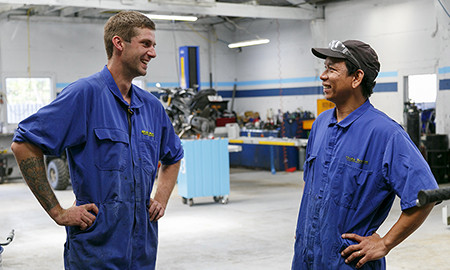Jette Josiah and Ryan De Leon completed their qualifications at Bike Torque in Taumarunui, a motorbike workshop where repairing machinery for racers is the passion of the business.
NEW ZEALAND Certificate in Motorcycle Engineering
Level |
Duration |
Training Fee |
|
|
|
|
3 and 4 |
3½ to 4 Years |
$1,189 excluding GST* |
get qualified with mito
Designed in consultation with industry, the New Zealand Certificate in Motorcycle Engineering (Level 3 and 4) will ensure that you can keep motorcycles running smoothly and safely—whether you’ve been in the industry for a while or are just starting out in your career. It will provide you with the skills and knowledge to safely and effectively diagnose and repair faults on motorcycles—including all-terrain vehicles, utility task vehicles and recreational off-highway vehicles.
The programme includes a mix of workplace practical learning and eLearning which allows you to complete theory elements of the programme in your own time and at your own pace. You can access eLearning resources, including videos, interactive simulations and online theory assessments, at any time and from any device—mobile phone, tablet or computer. Real-time results and progress reports are available through MITO’s online Portal to both you and your supervisor.
PROGRAMME OUTLINE
Choose to complete one or both of the following qualifications:
- New Zealand Certificate in Motorcycle Engineering (Level 3)
- New Zealand Certificate in Motorcycle Engineering (Level 4).
| QUALIFICATION OUTCOMES | LEVEL | CREDITS | |
| OUTCOME 1 | Follow workplace policies, procedures and relevant regulations to work safely and effectively in an automotive workshop. | 3 | 10 |
| OUTCOME 2 | Use tools and equipment to complete basic automotive workshop engineering tasks. | 3 | 15 |
| OUTCOME 3 | Apply fundamental automotive engineering knowledge to service vehicle systems. | 3 | 55 |
| OUTCOME 4 | Check operation of, and perform minor repairs on, electrical and electronic systems. | 3 | 40 |
| OUTCOME 6 | Monitor the workplace and respond to issues as required to maintain a safe and effective motorcycle engineering workplace. | 4 | 15 |
| OUTCOME 7 | Apply precautionary measures when diagnosing and repairing faults in motorcycle systems. | 4 | 10 |
| OUTCOME 8 | Diagnose and repair common faults in motorcycle engines and driveline systems. | 4 | 55 |
| OUTCOME 9 | Diagnose and repair common faults in motorcycle electronic and electrical systems. | 4 | 45 |
| OUTCOME 10 | Diagnose and repair a range of common faults in motorcycle steering, suspension and braking systems. | 4 | 35 |
TRAINING FEE
The training fee is $1,189 (excluding GST and any bulk learner discount). Note this is an annual fee and is refundable.
*Prices may vary for work visa holders.
SIGN ME UP!
If you are currently employed in an automotive workshop and your employer is able to support you, contact MITO and we'll organise an appointment to get you enrolled.
Get inspired
18-year-old Shane Turner always knew that he wanted to work in the motorcycle industry, but a chance encounter at a careers expo really pushed him to pursue his goal.



